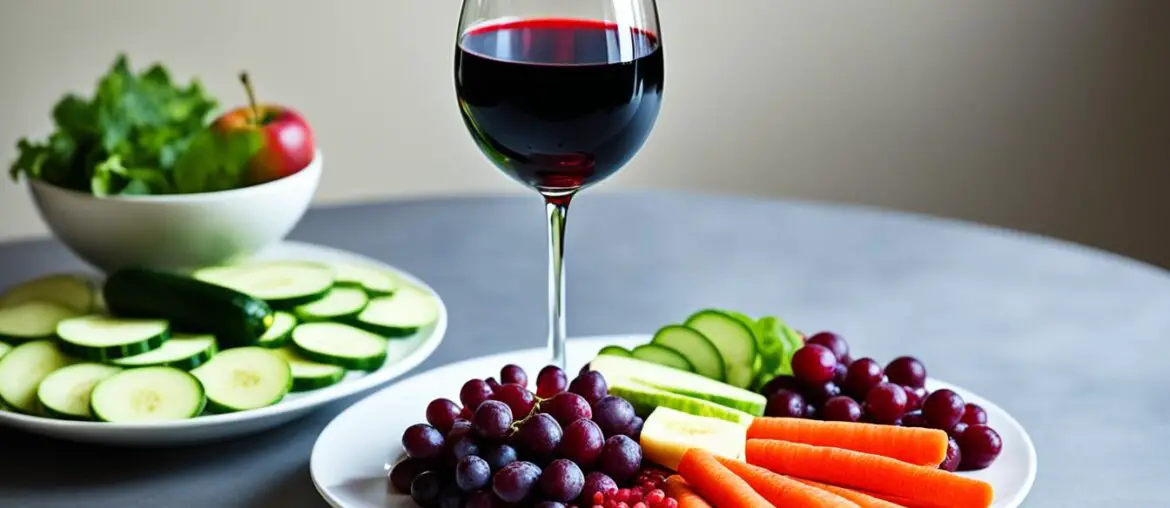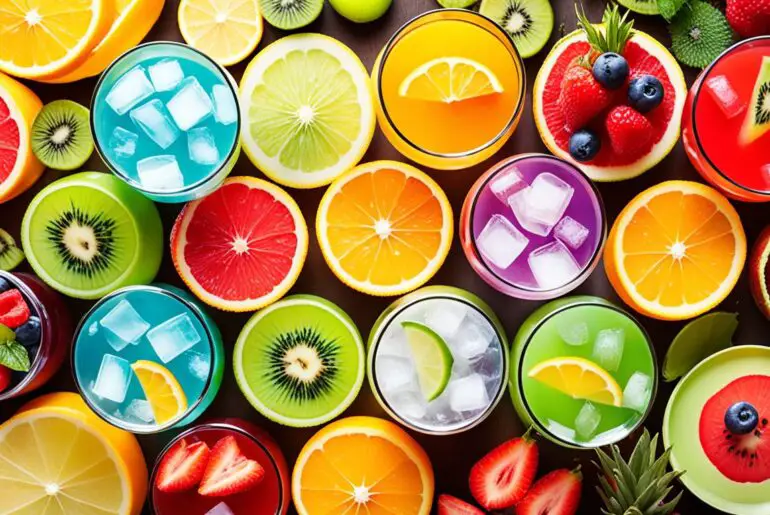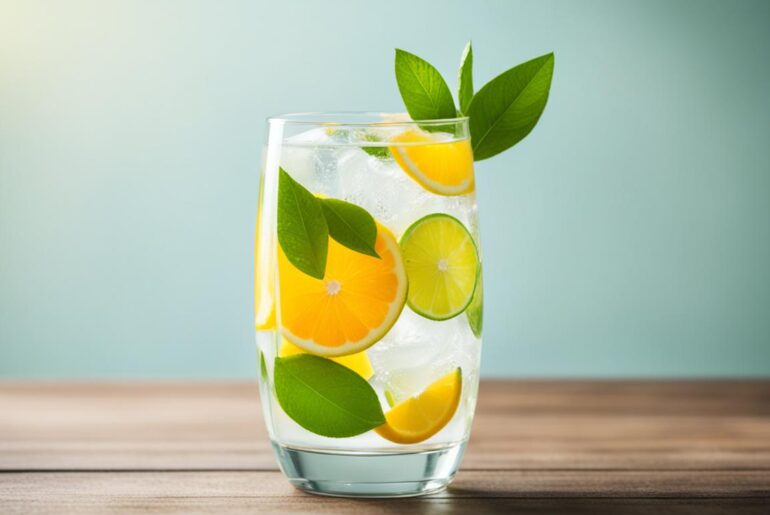Have you ever wondered how to navigate alcohol consumption after completing the HCG diet? Is it safe to reintroduce alcohol into your diet without compromising your weight loss results? Let’s explore the post-HCG diet alcohol reintroduction strategy and find out the guidelines to follow for a successful transition.
The HCG diet is known for its effectiveness in weight loss, but it’s crucial to have a plan for maintaining your weight after completing the program. Alcohol can be a tempting indulgence, but can consuming it after the HCG diet jeopardize your results? Let’s delve into the guidelines, considerations, and tips for reintroducing alcohol into your diet after the HCG diet.
Key Takeaways:
- Gradually increase calorie intake after the HCG diet to avoid weight gain
- Reintroduce normal foods slowly, starting with low-carb and low-fat options
- Establish an exercise routine to maintain weight loss
- When reintroducing alcohol, do so in moderation and choose lower-calorie options
- Consult with a healthcare professional or nutritionist for personalized guidance
What Should I Do to Maintain the Weight After HCG Diet?
To maintain weight after completing the HCG diet, there are a few key strategies you should follow. Gradually increasing your calorie intake, reintroducing normal foods slowly, and establishing an exercise routine will help you maintain your weight loss results. Here are some tips to help you navigate the post-HCG diet phase:
Gradually Increase Calorie Intake
Maintaining weight after HCG Diet involves gradually increasing your calorie intake. During the diet, your body is accustomed to a low-calorie intake, so suddenly consuming a high amount of calories can lead to weight gain. Start by adding 200 kcal per day for the first week and gradually increase until reaching a general optimum of 1500 kcal per day. This allows your body to adjust and prevents it from going into fat-storing mode.
Reintroduce Normal Foods Slowly
When it comes to reintroducing normal foods after the HCG diet, it’s important to do so gradually. Start with low-carb and low-fat options, and monitor your weight as you reintroduce different food groups. If you notice any weight gain, cut back on certain foods for a few weeks. This allows you to identify any trigger foods and make adjustments accordingly. Slowly reintroducing normal foods can also help your body ease into a regular eating routine, preventing any post-diet weight fluctuations.
Establish an Exercise Routine
Regular exercise is essential for maintaining weight loss after the HCG diet. During the diet period, strenuous exercise is not recommended due to the reduced calorie intake. However, after completing the diet, it’s important to establish a consistent exercise routine to prevent weight regain. Aim for at least 75 minutes of vigorous exercise or 150 minutes of moderate exercise per week. Incorporate a combination of cardiovascular and strength training exercises to maximize your results.
By gradually increasing your calorie intake, reintroducing normal foods slowly, and establishing an exercise routine, you can successfully maintain your weight after completing the HCG diet. Remember to be patient with your progress and make adjustments as needed. Prioritize your overall health and well-being, and enjoy the benefits of your weight loss journey.
The Importance of Gradually Increasing Calorie Intake
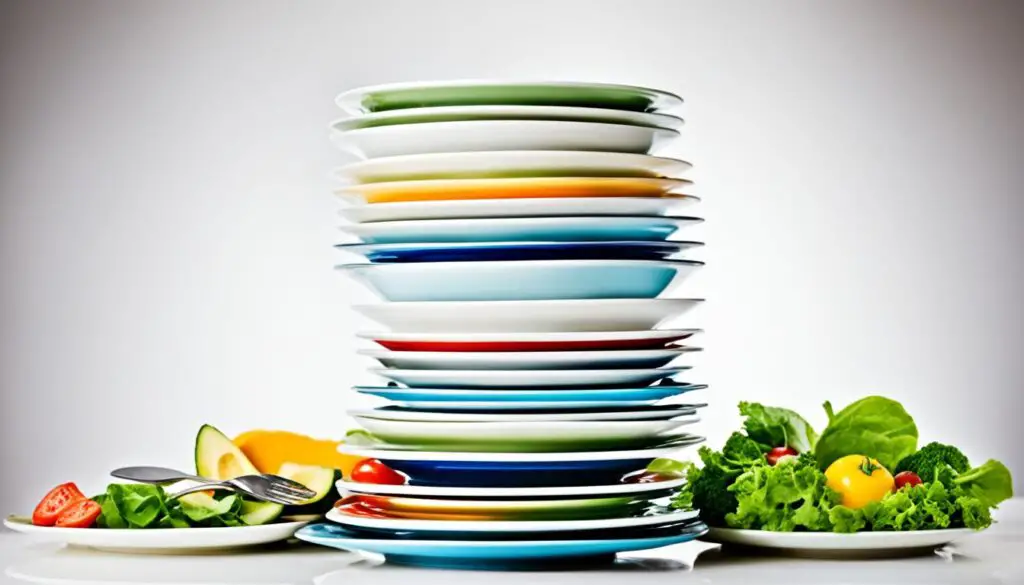
When it comes to maintaining weight after the HCG diet, one crucial aspect is the gradual increase of calorie intake. This helps avoid confusing the body and prevent unwanted weight gain. By slowly introducing more calories, the body can adjust and avoid going into fat-storing mode, which could hinder your weight maintenance efforts.
So how exactly should you go about increasing your calorie intake? It is recommended to start with a small increase of 200 kcal per day. This modest step allows your body to acclimate to the additional energy without overwhelming it. Over time, you can continue this gradual increase until you reach a safe and optimum intake of 1500 kcal per day, taking into consideration your individual needs and activity levels.
An important principle to keep in mind is that consistency is key. While it may be tempting to suddenly indulge in high-calorie foods, this can disrupt your progress and potentially lead to weight regain. By gradually increasing your calorie intake, you give your metabolism time to adapt and ensure a sustainable approach to maintaining your weight.
Here is a suggested breakdown of the gradual increase in calorie intake:
| Week | Calorie Increase | Total Calorie Intake |
|---|---|---|
| 1 | +200 kcal per day | 2000 kcal per day |
| 2 | +200 kcal per day | 2200 kcal per day |
| 3 | +200 kcal per day | 2400 kcal per day |
| 4 | +200 kcal per day | 2600 kcal per day |
| … | … | … |
| Week 7 | +200 kcal per day | 3000 kcal per day |
Note: This table serves as a general guideline and can be adjusted based on individual needs and preferences. Always consult with a healthcare professional or nutritionist for personalized recommendations.
By steadily increasing your calorie intake, you provide your body with the energy it needs to function optimally while maintaining your weight loss. Pair this gradual calorie increase with a balanced diet and regular exercise to maximize your results and sustain a healthy lifestyle.
Reintroducing Normal Foods After the HCG Diet
After completing the HCG diet, it is time to reintroduce normal foods back into your daily eating routine. However, this process should be done gradually to ensure a smooth transition and prevent any weight regain. The key is to start with low-carb and low-fat options and monitor your weight closely.
During the HCG diet, your body goes into a state of calorie restriction and fat burning. Reintroducing normal foods too quickly can shock your body and lead to weight gain. By gradually increasing your calorie intake, you allow your metabolism to adjust and avoid the dreaded rebound.
Begin the reintroduction phase by adding small portions of low-carb and low-fat foods to your meals. Choose lean proteins, vegetables, and whole grains. These options are nutritious, filling, and less likely to cause weight gain. Pay attention to your body’s response and adjust your food choices accordingly. If there is any weight gain, consider cutting back on certain foods for a few weeks.
Don’t forget portion control and moderation. Even though you are reintroducing normal foods, it is crucial to maintain portion sizes and avoid overeating. Be mindful of calorie content and choose nutrient-dense options that support your weight maintenance goals.
It is important to note that everyone’s metabolism is different, and it can take up to nine weeks for your body to fully reset. So be patient with the process and make minor adjustments to your diet as needed. Listen to your body and give it the time it needs to adjust.
Sample Reintroduction Plan
To help you with the process of reintroducing normal foods after the HCG diet, here is a sample plan:
- Week 1: Start by adding a small portion of lean protein (such as grilled chicken or fish) to one meal per day.
- Week 2: Add a serving of vegetables to another meal, focusing on non-starchy options like broccoli or spinach.
- Week 3: Incorporate whole grains into your diet, such as quinoa or brown rice. Start with a small portion and gradually increase over time.
- Week 4: Begin adding healthy fats, such as avocado or nuts, to your meals. Remember to keep portion sizes in check.
During this process, it is essential to continue monitoring your weight and adjusting your food choices accordingly. Consulting with a registered dietitian or healthcare professional can also provide personalized guidance and support.
In conclusion, reintroducing normal foods after the HCG diet requires a gradual and mindful approach. By starting with low-carb and low-fat options, monitoring your weight, and making gentle adjustments, you can successfully maintain your weight loss and establish a healthy eating routine.
The Role of Exercise in Maintaining Weight After the HCG Diet

Exercise plays a crucial role in maintaining weight after completing the HCG diet. While strenuous exercise is not recommended during the diet period due to the reduced calorie intake, it becomes essential after completing the program to prevent weight regain. Regular exercise helps in sustaining the weight loss achieved and promotes overall health and well-being.
Ideally, aim to engage in at least 75 minutes of vigorous exercise or 150 minutes of moderate exercise per week. This can include a combination of cardiovascular exercises like running, cycling, or swimming, as well as resistance training exercises like weightlifting or bodyweight exercises. The goal is to incorporate activities that you enjoy and that fit into your lifestyle, making exercise a sustainable and enjoyable part of your routine.
Exercise helps to maximize the benefits of the HCG diet by promoting muscle mass and boosting metabolism. It also helps to maintain lean body mass and prevent muscle loss, which can occur when the body goes into calorie deficit. Incorporating regular exercise routines enhances weight maintenance efforts and promotes sustainable results in the long term.
Additionally, exercise has numerous other health benefits beyond weight management. It improves cardiovascular health, strengthens bones and joints, reduces the risk of chronic diseases, and enhances mood and mental well-being. By prioritizing exercise after completing the HCG diet, you are not only maintaining your weight loss but also investing in your overall health and fitness.
Remember, consistency is key when it comes to exercise. Make it a habit to incorporate physical activity into your daily routine, and you will reap the rewards of your efforts. Listen to your body, start gradually if you are new to exercise, and gradually increase the intensity and duration as your fitness levels improve.
Overall, exercise is a vital component of maintaining weight loss after the HCG diet. By combining regular physical activity with healthy eating habits, you can ensure long-term success in maintaining your weight and enjoying the benefits of a healthier lifestyle.
Considerations for Reintroducing Alcohol After the HCG Diet
When reintroducing alcohol after the HCG diet, it is important to do so in moderation. Alcohol can be high in calories and may contribute to weight gain if consumed excessively. To enjoy alcohol responsibly while maintaining weight loss, limit your intake and choose lower-calorie options. It is also important to be mindful of the effects of alcohol on your metabolism and adjust your calorie intake accordingly.
Alcohol can have a significant impact on your weight management efforts, especially when reintroduced after a period of calorie restriction like the HCG diet. It’s essential to have a thoughtful and strategic alcohol reintroduction strategy to avoid derailing your progress and to maintain your weight loss.
Choose Moderation
When it comes to alcohol after the HCG diet, moderation is key. The excess calories in alcoholic beverages can add up quickly and hinder your weight maintenance goals. Limit your alcohol consumption and choose lower-calorie options such as light beer, wine spritzers, or mixed drinks made with diet sodas or low-calorie mixers.
Additionally, be mindful of the quantity of alcohol you consume in one sitting. Pace yourself and limit yourself to a certain number of drinks per occasion. This will help you stay within a reasonable calorie range and prevent excessive overindulgence.
Monitor Your Intake
As you reintroduce alcohol after the HCG diet, it’s crucial to monitor your intake and its effects on your weight. Track the amount and frequency of alcoholic beverages you consume and observe how it impacts your weight and overall progress.
Remember that alcohol varies in calorie content depending on the type and serving size. Familiarize yourself with the calorie content of different alcoholic beverages, and make informed choices accordingly. This will enable you to adjust your calorie intake from other sources to accommodate the calories from alcohol.
Adjust Calorie Intake
Alcohol can influence your body’s metabolism and the way it processes other nutrients. When reintroducing alcohol after the HCG diet, adjust your calorie intake accordingly to maintain a healthy balance.
Before incorporating alcohol into your daily or weekly routine, consider reducing calories from other sources. This may involve cutting back on certain high-calorie foods or adjusting portion sizes. Balancing your overall calorie intake is crucial for maintaining weight loss while still enjoying alcohol in moderation.
By following these considerations and incorporating alcohol responsibly into your post-HCG diet lifestyle, you can strike a balance between enjoying social occasions and maintaining your weight loss success. Remember to prioritize moderation, monitor your intake, and adjust your calorie intake to achieve long-term weight maintenance.
Creating a Post-HCG Diet Alcohol Plan
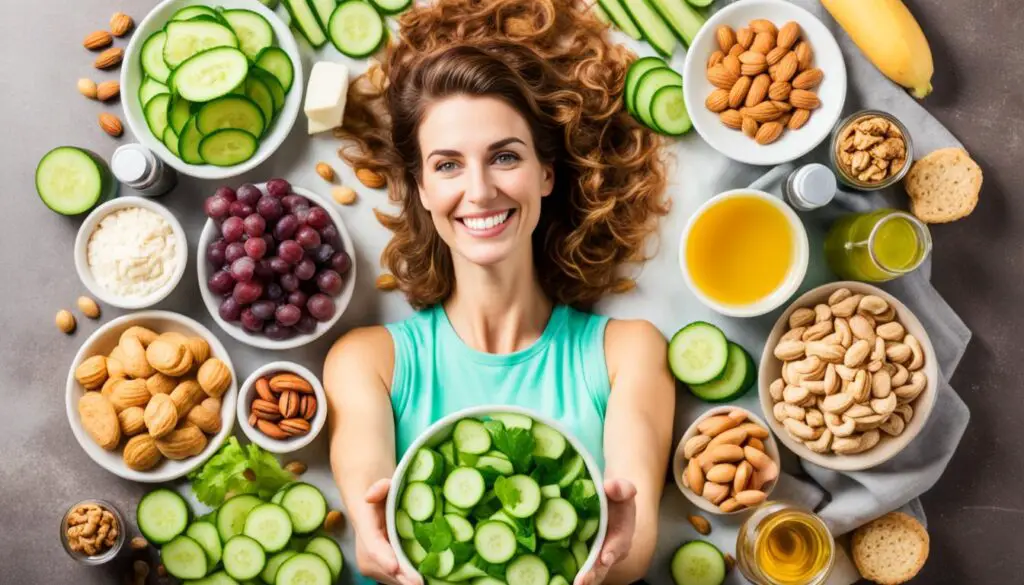
When it comes to reintroducing alcohol after completing the HCG diet, it is crucial to have a well-thought-out plan that aligns with your personal goals and preferences. Designing a post-HCG diet alcohol plan can help you maintain your weight while still enjoying an occasional drink. Here are some key strategies to consider:
- Set Limits: Establish clear guidelines for the amount and frequency of alcohol consumption. This will help you stay in control and prevent excessive calorie intake.
- Choose Lower-Calorie Options: Opt for drinks that are lower in calories, such as light beers, wine, or spirits mixed with low-calorie mixers. Avoid sugary cocktails or high-calorie beverages.
- Be Mindful of Portion Sizes: Watch how much you pour and be mindful of portion sizes. Use measuring tools or standard drink sizes to ensure you’re not exceeding recommended servings.
- Track Your Intake: Keeping a log of your alcohol consumption can be helpful in monitoring your intake and making adjustments if needed. It will also make you more aware of how alcohol fits into your overall calorie and nutrition goals.
- Seek Professional Guidance: Consulting with a healthcare professional or nutritionist who is familiar with the HCG diet and alcohol’s impact on weight maintenance can provide valuable guidance and support in creating your post-HCG diet alcohol plan.
Expert Insight:
“Having a structured plan for reintroducing alcohol after the HCG diet is essential. It allows individuals to maintain their weight loss while still being able to enjoy occasional drinks. By setting limits, making mindful choices, and seeking professional guidance, you can create a balanced approach to alcohol consumption post-HCG diet.” – Dr. Jane Smith, Nutritionist
Designing a post-HCG diet alcohol plan can empower you to make informed choices and maintain a healthy balance. By taking into account your personal goals, monitoring your alcohol intake, and seeking professional advice, you can enjoy occasional drinks while still prioritizing your weight management journey.
Tips for Reintroducing Alcohol After the HCG Diet

As you transition from the HCG diet to a more balanced eating plan, it’s important to approach the reintroduction of alcohol with caution and moderation. Here are some tips to help you navigate this process:
1. Gradually reintroduce alcohol
Start by introducing small amounts of alcohol to your diet and gradually increase the portion sizes over time. This gradual approach allows your body to adjust to the presence of alcohol and helps minimize any negative effects on your weight.
2. Choose lower-calorie options
When selecting alcoholic beverages, opt for lower-calorie options such as light beer, wine spritzers, or spirits mixed with soda water. These choices are typically lower in calories and can help you maintain your weight loss progress while still enjoying a drink.
3. Be mindful of portion sizes
It’s easy to lose track of how much alcohol you’re consuming, especially in social settings. Pay attention to the size of your drink and consider using smaller glasses to help control your portion sizes. This can prevent overconsumption and help you maintain your weight.
4. Adjust your calorie intake
Alcohol contains calories, so it’s important to account for these extra calories in your overall daily intake. If you choose to have an alcoholic beverage, consider reducing your calorie intake from other sources throughout the day to maintain balance.
Remember, moderation is key. Enjoying alcohol in moderation can be a part of a healthy lifestyle, but excessive consumption can lead to weight gain and other negative health effects. Listen to your body and make choices that align with your health goals.
By following these tips, you can reintroduce alcohol into your diet after the HCG diet without compromising your weight loss progress. Remember to prioritize moderation and make choices that support your overall health and well-being.
Having the right approach to reintroducing alcohol after the HCG diet can help you maintain your weight loss progress and enjoy a balanced lifestyle.
Conclusion
Following a structured post-HCG diet alcohol reintroduction strategy is crucial for maintaining weight after completing the HCG diet. Gradually increasing calorie intake, reintroducing normal foods, establishing an exercise routine, and practicing mindful alcohol consumption are key components of this strategy.
By gradually increasing calorie intake, individuals allow their bodies to adjust and prevent weight gain. Reintroducing normal foods slowly and in moderation helps prevent any sudden weight fluctuations. Regular exercise plays a vital role in preventing weight regain and maintaining a healthy lifestyle.
When it comes to alcohol, it’s important to consume it in moderation. Choosing lower-calorie options and being mindful of portion sizes can help individuals enjoy alcohol while still maintaining their weight loss results. By following these strategies and making necessary lifestyle adjustments, individuals can successfully integrate alcohol into their post-HCG diet plan.
FAQ
What should I do to maintain the weight after the HCG diet?
To maintain the weight after completing the HCG diet, it is recommended to gradually increase calorie intake, reintroduce normal foods slowly and in moderation, and establish an exercise routine.
Why is it important to gradually increase calorie intake?
Gradually increasing calorie intake is important to avoid confusing the body and prevent weight gain. It is recommended to start with a small increase of 200 kcal per day and continue until reaching a safe and optimum intake of 1500 kcal per day.
How should I reintroduce normal foods after the HCG diet?
After completing the HCG diet, it is essential to reintroduce normal foods slowly. Start with low-carb and low-fat options and keep everything in moderation. Monitor your weight during this period and adjust your food choices if there is any weight gain.
What is the role of exercise in maintaining weight after the HCG diet?
Exercise plays a crucial role in maintaining weight after the HCG diet. Regular exercise is necessary to prevent weight regain. Aim for at least 75 minutes of vigorous exercise or 150 minutes of moderate exercise per week. Cardio and resistance exercises are recommended, but any physical activity that fits your lifestyle can be effective in maintaining weight loss.
What should I consider when reintroducing alcohol after the HCG diet?
When reintroducing alcohol after the HCG diet, it is important to do so in moderation. Alcohol can be high in calories and may contribute to weight gain if consumed excessively. To enjoy alcohol responsibly while maintaining weight loss, limit your intake and choose lower-calorie options. It is also important to be mindful of the effects of alcohol on your metabolism and adjust your calorie intake accordingly.
How can I create a post-HCG diet alcohol plan?
To create a post-HCG diet alcohol plan, it is important to consider your personal goals and preferences. Start by setting limits on the amount and frequency of alcohol consumption. Choose lower-calorie options and be mindful of portion sizes. It may also be helpful to track your alcohol intake and make adjustments if needed. Consulting with a healthcare professional or nutritionist can provide additional guidance and support.
What are some tips for reintroducing alcohol after the HCG diet?
When reintroducing alcohol after the HCG diet, consider the following tips: be mindful of portion sizes, choose lower-calorie options, drink water alongside alcohol, and track your alcohol intake. Moderation is key to maintaining weight loss while still enjoying alcohol.

